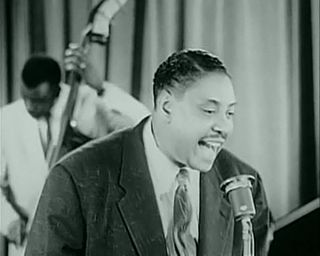
Rhythm and blues, frequently abbreviated as R&B or R'n'B, is a genre of popular music that originated within the African-American community in the 1940s. The term was originally used by record companies to describe recordings marketed predominantly to African Americans, at a time when "rocking, jazz based music ... [with a] heavy, insistent beat" was becoming more popular. In the commercial rhythm and blues music typical of the 1950s through the 1970s, the bands usually consisted of a piano, one or two guitars, bass, drums, one or more saxophones, and sometimes background vocalists. R&B lyrical themes often encapsulate the African-American history and experience of pain and the quest for freedom and joy, as well as triumphs and failures in terms of societal racism, oppression, relationships, economics, and aspirations.

Antoine Caliste Domino Jr., known as Fats Domino, was an American singer-songwriter and pianist. One of the pioneers of rock and roll music, Domino sold more than 65 million records. Born in New Orleans to a French Creole family, Domino signed to Imperial Records in 1949. His first single "The Fat Man" is cited by some historians as the first rock and roll single and the first to sell more than 1 million copies. Domino continued to work with the song's co-writer Dave Bartholomew, contributing his distinctive rolling piano style to Lloyd Price's "Lawdy Miss Clawdy" (1952) and scoring a string of mainstream hits beginning with "Ain't That a Shame" (1955). Between 1955 and 1960, he had eleven Top 10 US pop hits. By 1955, five of his records had sold more than a million copies, being certified gold.

New Orleans rhythm and blues is a style of rhythm and blues that originated in New Orleans. It was a direct precursor to rock and roll and strongly influenced ska. Instrumentation typically includes drums, bass, piano, horns, electric guitar, and vocals. The style is characterized by syncopated "second line" rhythms, a strong backbeat, and soulful vocals. Artists such as Roy Brown, Dave Bartholomew, and Fats Domino are representative of the New Orleans R&B sound.

David Louis Bartholomew was an American musician, bandleader, composer, arranger, and record producer. He was prominent in the music of New Orleans throughout the second half of the 20th century. Originally a trumpeter, he was active in many musical genres, including rhythm and blues, big band, swing music, rock and roll, New Orleans jazz, and Dixieland. In his induction into the Rock and Roll Hall of Fame, he was cited as a key figure in the transition from jump blues and swing to R&B and as "one of the Crescent City's greatest musicians and a true pioneer in the rock and roll revolution".
"Blue Monday" is a song written by Dave Bartholomew, first recorded in 1953 by Smiley Lewis and issued as a single, in January 1954, on Imperial Records. The single, with a slow-rocking beat, features an instrumental electric guitar solo by Lewis.
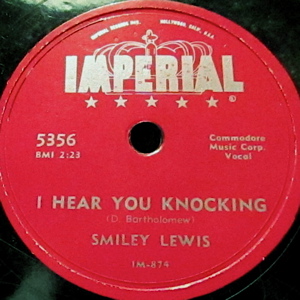
"I Hear You Knocking" is a rhythm and blues song written by American musician Dave Bartholomew. New Orleans rhythm and blues singer Smiley Lewis first recorded the song in 1955. The lyrics tell of the return of a former lover who is rebuffed.
"The Fat Man" is a song by American rhythm and blues recording artist Fats Domino. It was written by Domino and Dave Bartholomew, and recorded on December 10, 1949. It is often cited as one of the first rock and roll records or at least a strong influence on the genre. This was a "rollicking" song, according to The Guardian "but what made it a rocker was Fats's barrelling piano triplets, combined with a solid big beat".
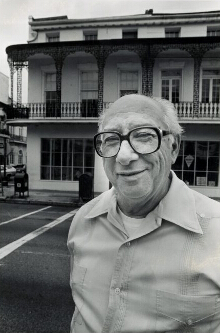
Cosimo Vincent Matassa was an American recording engineer and studio owner, responsible for many R&B and early rock and roll recordings.
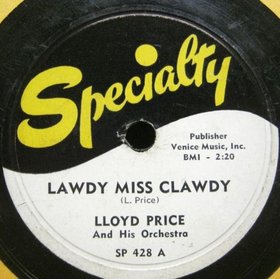
"Lawdy Miss Clawdy" is a song by New Orleans singer-songwriter Lloyd Price that "grandly introduced The New Orleans Sound". It was first recorded by Price in 1952 with Fats Domino and Dave Bartholomew during his first session for Art Rupe and Specialty Records. The song became one of the biggest selling R&B records of 1952 and crossed over to other audiences. "Lawdy Miss Clawdy" inspired many songs and has been recorded by a variety of artists.

"The Things That I Used to Do" is a blues standard written by Guitar Slim. He recorded it at Cosimo Matassa's J&M Recording Studio in New Orleans, where the young Ray Charles arranged and produced the session. Specialty Records released the song as a single in 1953 and it became a bestseller the following year. Specialty founder Art Rupe believed that the appeal would be limited to the Southern U.S. rural audience. However, urban rhythm and blues radio stations in the North began airing the song and built it into a national hit. As a result, Guitar Slim became in great demand as a performer and played at venues such as the Apollo Theater in New York City.
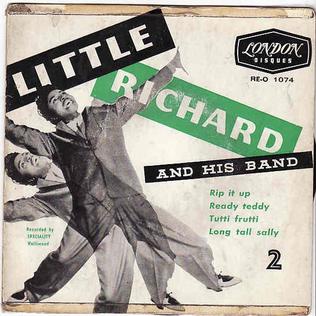
"Rip It Up" is a rock and roll song written by Robert Blackwell and John Marascalco. In June 1956, Specialty Records released it as a single by Little Richard with "Ready Teddy" as the B-side. The song reached the top position on the Billboard Rhythm & Blues Records chart as well as number 17 on the magazine's broader Billboard Hot 100. The version peaked at number 30 in the UK Singles Chart. The song was also recorded by Elvis Presley in 1956.

"I Know (You Don't Love Me No More)" is an R&B song written and recorded by American singer Barbara George, released as her debut single in 1961. It became her signature song and her only major hit in United States, reaching No.1 on the Billboard R&B singles chart and No.3 in the Hot 100. It was later covered by various artists, inducing Fats Domino, Cher, Ike & Tina Turner, and Bonnie Raitt. A Spanish version by Marisela topped Billboard's Latin chart in 1988. The Shirelles borrowed the melody of "I Know" for their 1963 cover of "Everybody Loves A Lover".

"I'm Walkin'" is a 1957 song by Fats Domino, written with frequent collaborator Dave Bartholomew. The single was Domino's third release in a row to reach No. 1 on the R&B Best Sellers chart, where it stayed for six weeks. It also broadened the singer's crossover appeal, peaking at No. 4 on the pop singles chart. The prominent saxophone solo was played by Herbert Hardesty. Lee Allen was also on sax, Frank Fields on bass, Earl Palmer on drums, and Walter "Papoose" Nelson on guitar.

Herbert Hardesty was an American musician who played tenor saxophone and trumpet. He is best known for his association with the New Orleans pianist Fats Domino and the producer Dave Bartholomew, beginning in 1948. He released six 45-rpm records as Herb Hardesty between 1959 and 1962. His first CD of these recordings, together with others made but not issued in 1958, were released worldwide in July 2012 by Ace Records as The Domino Effect.
Frank Nomer Fields was an American double bass player who was involved in many R&B, rock and roll and jazz recordings made in New Orleans.
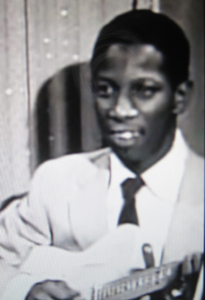
Walter Charles Nelson Jr., known as Walter "Papoose" Nelson, was an American R&B guitarist, best known for playing with Fats Domino, and on many of his hit records.

Mary Jewel King was an American rhythm and blues singer in New Orleans.

"Be My Guest" is a song written by Fats Domino, John Marascalco and Tommy Boyce. Arranged and produced by Dave Bartholomew and recorded by Domino on September 26, 1959, it was released as a single by Imperial Records the following month and reached number 8 on the Billboard pop chart, number 2 on the R&B chart, and number 11 on the UK singles chart.
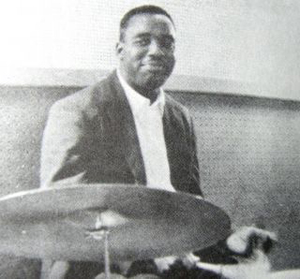
Charles "Hungry" Williams was an American rhythm & blues drummer, best known for the innovative and influential technique he used on numerous recordings that came out of New Orleans in the 1950s and 1960s.

Cornelius Jessie Coleman, also called "Tenoo", was an American R&B drummer best known for playing with Fats Domino's band and on many of his hit records.
















